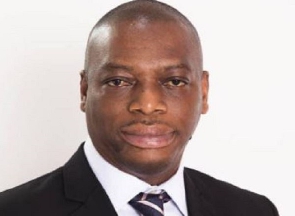- Home - Entertainment
- Lifestyle News
- Entertainment Videos | TV
- Year In Review
- Music News
- Entertainers
- Entertainment Archive
- Entertainment Photos
- Jokes
- Entertainment Headlines
- Ameyaw Debrah
- Brown GH
- Celebrities Buzz
- GH Base
- Ghana Celebrities
- Gh Gossip
- GH Page
- GH Splash
- Hot Gossip GH
- YEN

Entertainment of Thursday, 1 August 2019
Source: Georgina Boateng
The enthusiastic, wonderful world of DJ Tygh
If you have never been to a DJ Tygh (pronounced Tiga’h) event, you might have heard of, seen pictures from or have been regaled with wild tales from one. Otherwise, you haven’t lived yet.
Born Alex Offei Anim,a proud product of Abuakwa State College, the soft-spoken DJ, just a year shy of 29, has amassed a cult following for events; social and corporate alike.
On any given night of the weekend, DJ Tygh can be found behind the DJ booth in his signature corporate look, spinning blissful records or bouncing global tracks for Kontihene, hosting of the Tygh Experience Show which has seen artists such as Obibini,Fameye,Stay Jay and Lady Prempeh to mention a few or all forms of events with eager partygoers and music lovers.
With a 'failure is not an option' mentality, Tygh put his all into his DJ career from a background of campus radio from University for Development Studies, WA Campus, the Radio Personality of the year (2013/2014) – Life Style Awards winner is nearing completion of MA Marketing Strategy master’s degree from the University of Ghana Business School. He has combined DJ and being in the insurance industry for the past 9 years.
After university, Tygh has been resident DJ for Cahaya Lounge, Happy Hour Lounge and Kiki Bees Lounge as well as played for renowned events such as Sallahfest Darkuman.
Thanks to the tireless work of activists and a genuine change in cultural values, inclusivity is the buzzword of the moment where making people feel good actually matters. Nightlife is no exception. Every generation bemoans the loss of "good nightlife," the Good Old Days having seemingly ended just before the current crop of twenty-somethings turned 18. But there is fun to be had everywhere; you just have to know where to look the right DJ.
He mentions industry legends like DJ Black from Ghana, TLM and DJ Angelo as heroes of his, and notes that the goal is always to make as many people feel welcome as possible while still maintaining the right vibe.
"My long-term goal is to diversify the size of the parties," DJ Tygh says. "Every party right now is about 500 people. I want to be able to do a 1000-person party, but then also do a 200-person party; I want to fluctuate in the size of my events, so it doesn't feel like it's always the same.
Community is a word that comes up often in our conversation; DJ Tygh is committed to making sure his parties represent the actual heart of Ghana, which can be challenging in Accra. If people are naturally drawn to groups of people that look and act just like them, then creating a diverse space requires intention.
What makes a good DJ? "The life of the party. Someone who you see out that you want to be partying with. It's not about Instagram followers. Some of the best DJs have 2000 followers on Instagram. Just because you have a lot of followers online, doesn't mean that people want to party with you. And I think brands can confuse that, too. Just because you have a lot of followers, doesn't mean that you're interesting."
So how does one become a successful DJ in an oversaturated market, and an overcrowded city? For Tygh, it means taking a big leap of faith. Like so many young, creative people, Tygh wants more for himself. "I feel like it would've taken me forever to become someone, if that makes sense.
However, he attributes his success as a professional DJ to the same secret his event is a hit: kindness.
"Talent can only take you so many places," he says, "but being a hospitable person takes you far, because so many people in this industry are not. People want to be at welcome places. They don't want to be turned away at the door because, you know, there's a million places to go now. There are so many options, if you're not welcoming people, they'll go somewhere else."
But until then, DJ Tygh will keep playing his parties. "Music is — for me — a reflection of culture," he says. "I don't think culture is dying, but culture changes. And the way we consume culture changes. You should know the right place and time to be.”











